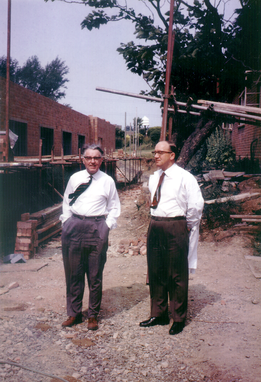Louis Harold Gray
Louis Harold Gray was a prominent British physicist and radiobiologist known for his significant contributions to the field of radiation biology. Born on November 10, 1905, in Bristol, England, Gray's work revolutionized the understanding of the effects of ionizing radiation on living organisms.
Gray's research focused on quantifying the biological effects of radiation exposure, particularly in the context of cancer treatment and radiation therapy. He developed the concept of the Gray as a unit of absorbed dose of radiation, which is widely used in radiation oncology and radiology.
Throughout his career, Gray conducted extensive studies on the mechanisms of radiation damage to cells and tissues, shedding light on the complex interactions between ionizing radiation and living organisms. His work laid the foundation for modern radiation therapy techniques and safety standards.
In recognition of his pioneering contributions to the field of radiobiology, Gray was awarded numerous honors and accolades, including the Commander of the Order of the British Empire.
Louis Harold Gray's legacy continues to inspire generations of researchers and medical professionals in the field of radiation biology and oncology. His groundbreaking work has had a lasting impact on the understanding and application of radiation in medicine.
Search WikiMD
Ad.Tired of being Overweight? Try W8MD's physician weight loss program.
Semaglutide (Ozempic / Wegovy and Tirzepatide (Mounjaro / Zepbound) available.
Advertise on WikiMD
|
WikiMD's Wellness Encyclopedia |
| Let Food Be Thy Medicine Medicine Thy Food - Hippocrates |
Translate this page: - East Asian
中文,
日本,
한국어,
South Asian
हिन्दी,
தமிழ்,
తెలుగు,
Urdu,
ಕನ್ನಡ,
Southeast Asian
Indonesian,
Vietnamese,
Thai,
မြန်မာဘာသာ,
বাংলা
European
español,
Deutsch,
français,
Greek,
português do Brasil,
polski,
română,
русский,
Nederlands,
norsk,
svenska,
suomi,
Italian
Middle Eastern & African
عربى,
Turkish,
Persian,
Hebrew,
Afrikaans,
isiZulu,
Kiswahili,
Other
Bulgarian,
Hungarian,
Czech,
Swedish,
മലയാളം,
मराठी,
ਪੰਜਾਬੀ,
ગુજરાતી,
Portuguese,
Ukrainian
Medical Disclaimer: WikiMD is not a substitute for professional medical advice. The information on WikiMD is provided as an information resource only, may be incorrect, outdated or misleading, and is not to be used or relied on for any diagnostic or treatment purposes. Please consult your health care provider before making any healthcare decisions or for guidance about a specific medical condition. WikiMD expressly disclaims responsibility, and shall have no liability, for any damages, loss, injury, or liability whatsoever suffered as a result of your reliance on the information contained in this site. By visiting this site you agree to the foregoing terms and conditions, which may from time to time be changed or supplemented by WikiMD. If you do not agree to the foregoing terms and conditions, you should not enter or use this site. See full disclaimer.
Credits:Most images are courtesy of Wikimedia commons, and templates, categories Wikipedia, licensed under CC BY SA or similar.
Contributors: Prab R. Tumpati, MD

